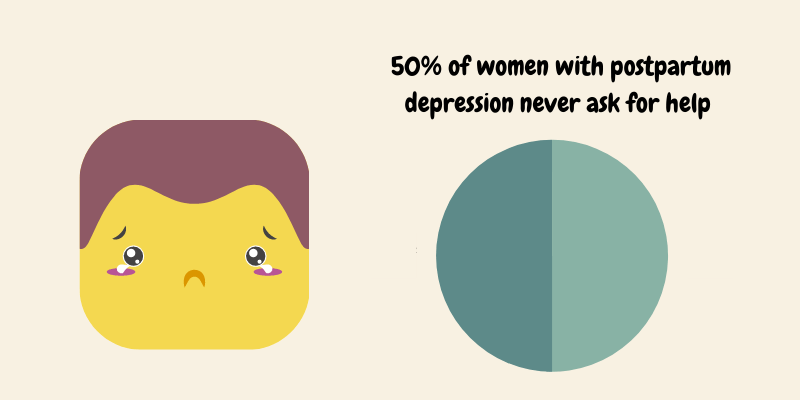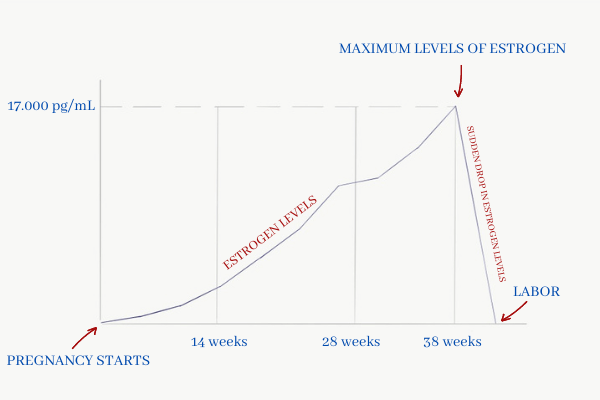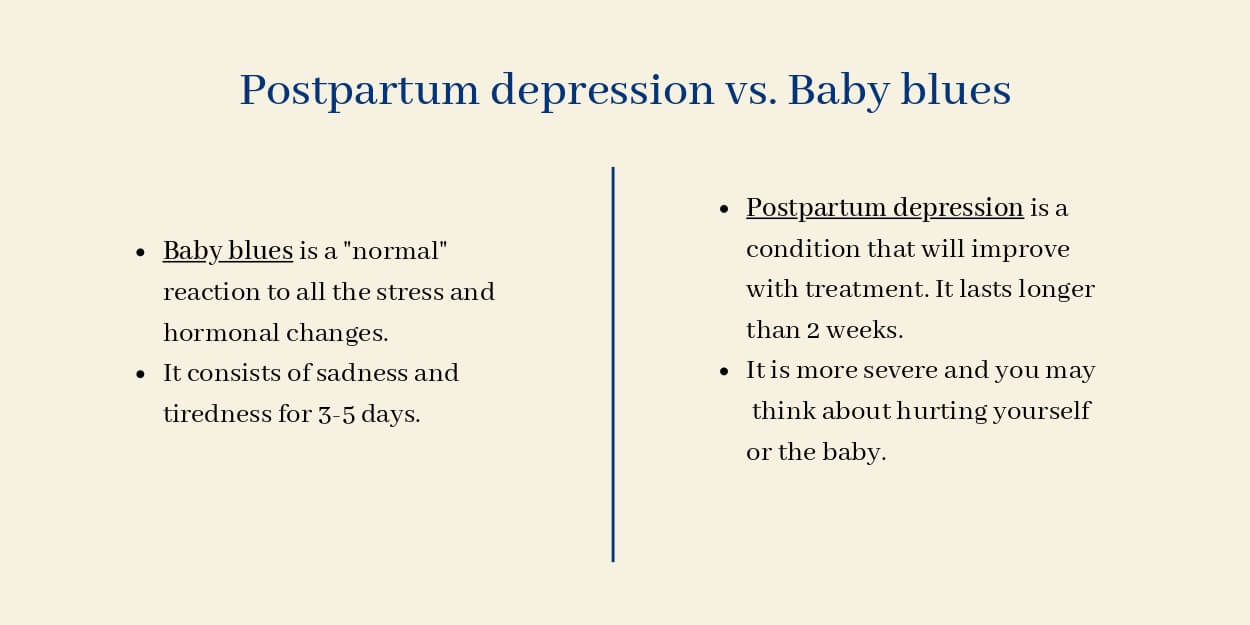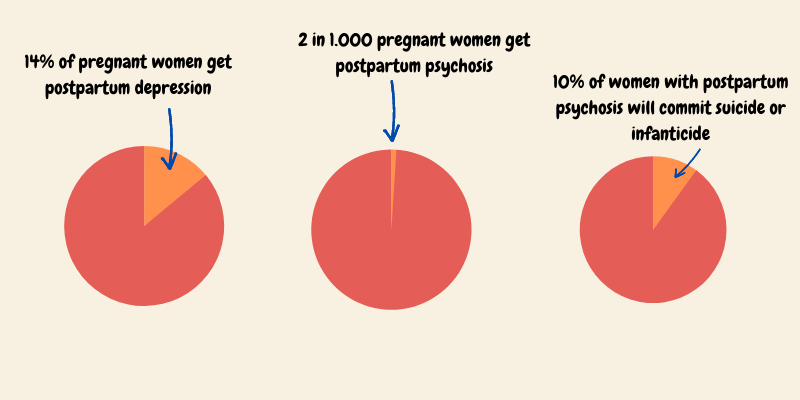POSTPARTUM DEPRESSION IS TOUGH, YES. BUT IT‘S ALSO TEMPORARY WITH THE RIGHT APPROACH
After labor, you may feel exhausted. You can feel scared too. How different will my life be after this? Will I be a good mother? Those feelings and doubts are completely normal. However, 1 out of 7 pregnant women sinks into a place of sadness and emptiness. When this situation lasts for longer than 2 weeks we call it postpartum depression. And it‘s important to recognize it early as it usually takes a toll on your loved ones and on yourself. Fortunately, it is usually a reversible condition. And with the right treatment and support, you can recover even faster.
[box type=”shadow”]
INTRODUCTION
Is Postpartum Depression A Mental Illness?
Can Postpartum Depression Start Weeks or Even Months After Labor?
THE FACTS
How Does Postpartum Depression Affect Your Baby?
And How Does It Affect Your Partner?
THE SOLUTION
Electroconvulsive Therapy (ECT)
[/box]
Is postpartum depression a mental illness?
Yes, it is. It is a condition in that it’s different than just “feeling sad”. We talk about postpartum depression when you feel sad, empty, with no energy… for at least 2 weeks. It’s actually quite common: one out of 7 women suffers it.

If you feel all those symptoms for less than 2 weeks that’s what doctors call “baby blues”. Both baby blues and postpartum depression are due to a hormonal imbalance. During pregnancy hormone levels are really high, and they reach a maximum right before labor. Then they drop again. This sudden drop in your hormone levels affects your mood, leaving with a sensation of emptiness, tiredness, and sadness.

Normally, this situation will go away in 3-5 days (baby blues). In other cases, it lasts longer and that’s when we call it postpartum depression.
However, hormones aren’t the only factor. We know this because fathers can also get postpartum depression (but at lower rates). And adoptive parents get it too. In these cases, it is probable due to stress and exhaustion, the sleepless nights, and more.
Can postpartum depression start weeks after labor?
Postpartum depression usually starts right after labor or some days after it. But in some cases, it can happen weeks or months later. Sometimes, the stress of the immediate postpartum period will keep you from noticing anything else. Like sadness, emptiness… You will be too stressed and focused to feel anything else. After this initial stress goes away and you get to “relax” you may start to get all these unwelcome feelings.
How do I know if I have postpartum depression?
It’s normal to feel tired or scared after having a baby, especially if it’s your first baby. Of course, having a baby it’s a big event that will require you to change your life. Put this is something else. Postpartum depression is, as you can guess, a type of depression. It’s temporary, yes, but it is a mental condition.
You know you have postpartum depression if you are sad, empty, hopeless for more than 2 weeks. Also, you can stop eating or eat too much. And the same with sleep.

You can start to get distant from your family, friends, and partner. You can even get distant from your baby. Actually, this is very typical. You may even think that the baby is’t yours. Some women say they think about hurting themselves or the baby.
Unfortunately, some of them can indeed hurt themselves or the baby, but that’s not the most common situation. When it happens, it’s usually because the mother has a more severe condition: postpartum psychosis. 1-2 women out of 1000 will get postpartum psychosis. Sadly, 10% of them will commit suicide or infanticide.

How does postpartum depression affect your baby?
As you can imagine by now, postpartum depression can be devastating for yourself, your baby, and your partner. In extreme cases, you can harm your baby or yourself. That is why it’s so important to be aware of this condition and seek help. Remember it is not you who‘s thinking about hurting your baby. It’s this horrible condition that’s making you think that. Seek help because it will be ok. There are treatments and it will go away with help.
And how does it affect your relationship with your partner?
We know that half of the men whose partners suffer postpartum depression will develop depression themselves. But even if they don’t get depressed in the clinical meaning of the word, the relationship will suffer.
Postpartum depression can make you get away from your loved ones. So your partner will get a tough time seeing how you get more and more distant. If he is not aware of the problem, things will probably get worse. You can get into fights instead of getting the support you need.
That’s why, if you are suffering from postpartum depression, you must tell your partner. He or she will be relieved to see that this is a common problem. And that it doesn’t have to do with you not loving him/her anymore, or the baby. He may not even be aware of this problem. Not even know it exists. So tell him. Let him read this article.
And once you both know what this is about, go look for medical help. Once you realize this is a common problem, there‘s no sense in not doing so.
How do you treat postpartum depression?
· Therapy
During therapy, you will get to talk about how you are feeling with a psychologist or psychiatrist. They will listen to you and help you understand what’s happening to you. Also, they will provide you with some techniques to fight the different symptoms you experience. Those tools include behavioral therapy, relaxation techniques…
Usually, the best approach is a mix of therapy and medication.
· Medication
The most common drugs to treat postpartum depression are antidepressants, of course. The most widespread ones are Selective Serotonin Re-uptake Inhibitors (SSRIs). They are widely used because they work really well and have less secondary effects than the others. However, it takes time for them to work, around 4 weeks.
Some of the SSRIs can be taken while breastfeeding, like sertraline and paroxetine. However, make sure to talk to your doctor, who must prescribe any medicine you take.
There are other options, like brexanolone, approved by the Food and Drug Administration (FDA). The downside is it must be administered through an I.V. for over 2 days, so you’ll have to be admitted to the hospital or clinic. Brexanolone can be taken while breastfeeding. But again, you must consult your doctor about all these things.
Another option is esketamine, which is administered through a nasal spray. Esketamine should not be taken while breastfeeding, let alone while pregnant.
· Electroconvulsive Therapy (ECT)
Even though it may seem savage, it’s not. Even though we keep it for severe cases, it is a very valid option when all the other options don’t work. Especially when there is a risk for the mother and the baby like in postpartum psychosis.
Unlike what we’ve seen in many movies, ECT is not a painful procedure. It is performed under anesthesia, to prevent you from moving and hurting against the bed or something. Surprisingly, it is also harmless for the baby (yes, you can get electroconvulsive therapy while pregnant).
I hope you‘ve found this post helpful and wish you all the luck in the world.
Leave a Reply